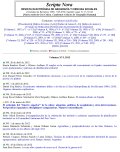“Making parents”: between lists and registries. from discretionality to professionalized selection
Keywords:
adoption of children, family morality, governmental management, professional knowledgeAbstract
In 2005, the creation in Argentina of the Unique Registry of Adopters was grounded on the need to make the adoption of children more transparent and to limit the discretionality that judges enjoyed to select potential adopters. In this article, we contextualize the creation of the mentioned Registry to understand the senses with which it is endowed and the features that the “sanitization” of the adoption process has acquired in our context. At the same time, we analyze the actions developed by its professionals aimed at evaluating future adopters, as well as at transmitting a certain family morality that – by integrating topics such as the children’s “right to identity” and the respect for their history, and by privileging the reflexive attitude of those who wish to adopt a child – contributes to recreate and/or reify ways of practical and symbolic identification of the “urban middle class”.Downloads
Published
2012-03-22
Issue
Section
Articles
License
Los autores que publican en esta revista están de acuerdo con los siguientes términos:
- Los autores conservan los derechos de autoría y otorgan a la revista el derecho de primera publicación, cin la obra disponible simultáneamente bajo una Licéncia de Atribución Compartir igual de Creative Commons que permite compartir la obra con terceros, siempre que estos reconozcan la autoría y la publicación inicial en esta revista.
- Los autores son libres de realizar acuerdos contractuales adicionales independientes para la distribución no exclusiva de la versió de la obra publicada en la revista (com por ejemplo la publicación en un repositorio institucional o en un libro), siempre que se reconozca la publicación inicial en esta revista.





